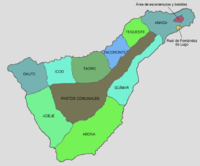
The Guanches were the indigenous inhabitants of the Canary Islands in the Atlantic Ocean some 100 kilometres (60 mi) west of the North African coast. They spoke the Guanche language, which went extinct in the 17th century and is believed to have been related to Berber languages.

The First Battle of Acentejo took place on the island of Tenerife between the Guanches and an alliance of Spaniards, other Europeans, and associated natives, on 31 May 1494, during the Spanish conquest of this island. It resulted in a victory for the Guanches of Tenerife.
The Battle of Aguere, or Battle of San Cristóbal de La Laguna, was fought between forces of the Crown of Castile, led by the Adelantado Alonso Fernández de Lugo, and the natives of Tenerife, called Guanches. The battle took place on 14-15 November 1494.

Beneharo was a Guanche king of Menceyato de Anaga on the island of Tenerife.

Acaimo or Acaymo was a Guanche mencey of Tacoronte, on the island of Tenerife at the time of the Spanish conquest in the 15th century. He formed an alliance against the Spaniards with the mencey Beneharo and the mencey Bencomo.

The conquest of the Canary Islands by the Crown of Castile took place between 1402 and 1496 and described as the first instance of European settler colonialism in Africa. It can be divided into two periods: the Conquista señorial, carried out by Castilian nobility in exchange for a covenant of allegiance to the crown, and the Conquista realenga, carried out by the Spanish crown itself, during the reign of the Catholic Monarchs.

Tacoronte was one of nine menceyatos guanches in which the island of Tenerife was divided at the time of the arrival of the conquering Spaniards.

Abona was one of nine menceyatos guanches that has divided the island of Tenerife after the death of mencey Tinerfe, in the days before the conquest of the islands by the Crown of Castile.

Güímar was one of nine menceyatos guanches that was divided island of Tenerife at the time of the arrival of the Castilian conquerors. Occupied an area significantly greater than the actual municipality of Güímar, including part of Santa Cruz de Tenerife and San Cristóbal de La Laguna, El Rosario, Candelaria, Arafo and Fasnia, himself and perhaps a small part of the town of Arico.

Taoro was one of nine Guanche menceyatos in which the island of Tenerife was divided at the time of the arrival of the conquering Spaniards.

Anaga was one of the 9 menceyatos guanches in which was divided the island of Tenerife before the arrival of the conquering Spaniards.

Adeje was one of the 9 menceyatos guanches that had divided the island of Tenerife before the arrival of the conquering Spaniards and occupied the present day towns of Guía de Isora, Adeje, Santiago del Teide, as well as possibly also part of Arona, in the southwest of Tenerife.

Daute was one of nine menceyatos guanches that was divided the island of Tenerife (Spain) after the death of King Tinerfe, in the period before the conquest of the islands by the Crown of Castile.

Tegueste was one of nine Guanche menceyatos, which ruled Tenerife on the Canary Islands before the Castilian conquest.

Tinerfe "the Great", legendary hero who was a guanche mencey of the island of Tenerife. It is estimated that he lived at the end of the 14th century.

Adjona, also written Adxoña or Atxoña was the Guanche mencey (king) of the Menceyato de Abona at the time of the conquest of Tenerife in the fifteenth century.

Pelinor was a Guanche mencey king of Menceyato de Adeje at the time of the conquest of Tenerife in the fifteenth century.

Romen was a Guanche mencey king of Menceyato de Daute in times of the conquest of Tenerife in the fifteenth century.

Tegueste or Tegueste II was a Guanche King (mencey) of Menceyato de Tegueste, reigning during the conquest of Tenerife in the fifteenth century.
Guacimara is the name of a strong worrier Guanche woman, daughter of the king or Mencey of the Menceyato of Anaga in the Canary Islands, at a time prior to the arrival of the European conquerors at the end of the XV century.










